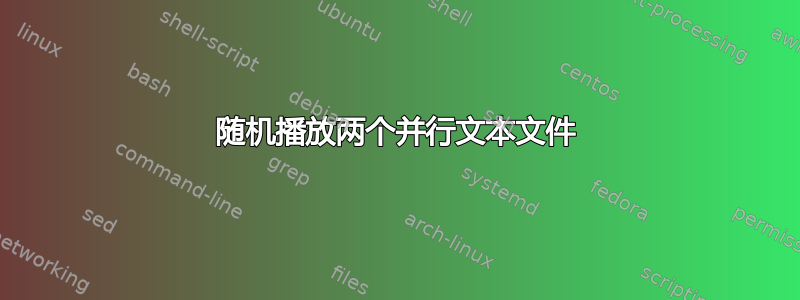
我有两个句子对齐的平行语料库(文本文件),约有 5000 万单词。 (来自 Europarl 语料库 -> 法律文件的平行翻译)。我现在想打乱两个文件的行,但两者的方式相同。我想使用 gshuf (我在 Mac 上)使用一个唯一的随机源来解决这个问题。
gshuf --random-source /path/to/some/random/data file1
gshuf --random-source /path/to/some/random/data file2
但我收到了错误消息end of file,因为显然随机种子需要包含要排序的文件包含的所有单词。真的吗?如果是,我应该如何创建一个适合我的需要的随机种子?如果不是,我可以通过什么其他方式并行随机化文件?我考虑过将它们粘贴在一起,随机化,然后再次拆分。然而,这看起来很难看,因为我需要首先找到文件中没有出现的分隔符。
答案1
我不知道是否有更优雅的方法,但这对我有用:
mkfifo onerandom tworandom threerandom
tee onerandom tworandom threerandom < /dev/urandom > /dev/null &
shuf --random-source=onerandom onefile > onefile.shuf &
shuf --random-source=tworandom twofile > twofile.shuf &
shuf --random-source=threerandom threefile > threefile.shuf &
wait
结果:
$ head -n 3 *.shuf
==> onefile.shuf <==
24532 one
47259 one
58678 one
==> threefile.shuf <==
24532 three
47259 three
58678 three
==> twofile.shuf <==
24532 two
47259 two
58678 two
但文件的行数必须完全相同。
GNU Coreutils 文档还提供了一个很好的解决方案,用于使用openssl种子随机生成器来实现重复随机性:
https://www.gnu.org/software/coreutils/manual/html_node/Random-sources.html#Random-sources
get_seeded_random() { seed="$1" openssl enc -aes-256-ctr -pass pass:"$seed" -nosalt \ </dev/zero 2>/dev/null } shuf -i1-100 --random-source=<(get_seeded_random 42)
但是,请考虑使用比“42”更好的种子,除非您希望其他人也能够重现“您的”随机结果。


